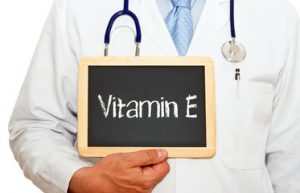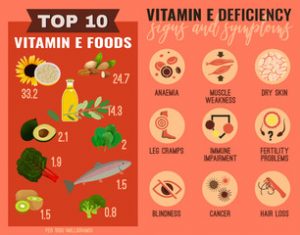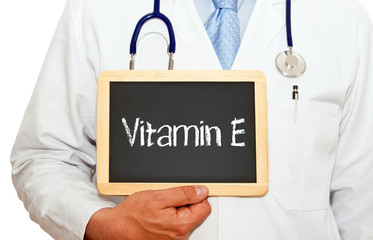Have you been experiencing stiffness in your muscles lately? Or sometimes you feel your vision has disoriented. Do not ignore these signs as they can be the precursors to something that might cause a detrimental effect over your body. You would be surprised to know that vitamins and minerals are substances that can make or break your system and one such essential vitamin is Vitamin E. There are so many health risks associated with vitamin E deficiency.
It is a vital vitamin that is responsible for zillions of functions in the human body, and vitamin E deficiency can be fatal when left unattended. It is advisable not to ignore the signs that your body gives you on getting deficient. Read on and find out what happens to your body when you have a deficiency of vitamin E. This beneficial article will also help you learn about vitamin E, vitamin E deficiency, symptoms of vitamin E deficiency and the health risks associated with vitamin E deficiency.
What is Vitamin E?

Vitamin E is an essential part of our body that keeps it healthy and fights diseases. Vitamin E is fat-soluble and is a powerful antioxidant, which you can find in foods such as fish, fruits, vegetables, and nuts. It mainly gets stored in the liver before being released into the bloodstream.
Vitamin E is used in various skin care products as it is incredibly beneficial to the skin. Apart from that, it can improve heart health, vision, immunity, and symptoms of arthritis. Vitamin E has countless benefits for humans, and the deficiency of it is rare. Vitamin E deficiency can occur in people with genetic disorders and low-weight premature babies. The health problems that come with a vitamin E deficiency can be identified through their symptoms and treated with vitamin E.
Vitamin E is also an essential vitamin that is needed for the proper function of many organs in the body. Vitamin E is an antioxidant, which simply means it helps to slow down processes that damage cell and cause cancer.
Symptoms of Vitamin E deficiency
For an average person, the overall Vitamin E level is within the range of 5.5-17 milligrams per liter, varying for children under 17 and premature infants. When an adult has less than 4mg/L of Vitamin E in their blood, they might take supplements. Vitamin E occurs in eight chemical forms, and a blood test can determine how much of one sort, i.e., alpha-tocopherol a person has in their blood which determines the overall level of Vitamin E.
Low levels of Vitamin E show the following symptoms :–
• Coordination and walking difficulties
Specific neurons called the Purkinje neurons can break down, caused by a vitamin E deficiency, which harms their ability to transmit signals causing coordination problems and struggle to walk.
• Muscle Weakness
Vitamin E is essential to the central nervous system and is a powerful antioxidant. A deficiency of it can cause oxidative stress which leads to pains and muscle weakness.
• Numbness and tingling
Nerve fibers can get damaged due to vitamin E deficiency. It prevents nerves from transmitting signals correctly and results in sensations, known as peripheral neuropathy.
• Vision deterioration
Lack of vitamin E in your body can weaken light receptors in your retina and other cells in the eye which can decrease eyesight over time.
• Problems with the immune system
A vitamin E deficiency makes you more prone to diseases, and you could fall ill easily. Older adults are more at risk because of the lack of Vitamin E can inhibit immune cells.
• General unwellness
A vitamin E deficiency makes your body weaker, and it is more difficult to fend off viruses, therefore, leaving you unwell more often.
Diseases and Health Risks Associated with Vitamin E Deficiency
Vitamin E deficiency is extremely rare with healthy people. If a person does not have enough vitamin E in their body, it gets almost always linked with an underlying disease they might already have. These diseases prevent the body from adequately digesting or absorbing fat.
A vitamin E deficiency can cause muscle and nerve damage that makes the person experience a loss of feeling in their arms and legs, loss of body movement control, vision problems, and muscle weakness. Listed below are several diseases that get associated with this phenomenon:
1. Crohn’s disease
Crohn’s disease is an inflammatory bowel condition which commonly occurs in the colon and the small intestine. It can affect any part from the mouth to the anus of the gastrointestinal tract. Crohn’s disease can be mild to debilitating leading to life-threatening flares and complications.
2. Cystic fibrosis
Cystic fibrosis is a genetic condition that causes severe damage to the digestive and respiratory systems, resulting in the formation of mucus in the organs like lungs, liver, intestines, and pancreas.
3. Abetalipoproteinemia
Abetalipoproteinemia is a genetic condition in children that prevents proper absorption of fats and cholesterol causing impairments of the nervous system and potentially causing slower intellectual development and eye disorders.
4. Ataxia
Ataxia is a rare genetic condition that is a degenerative disease of the nervous system causing the person to have slurred speech, stumbling, falling, and incoordination. It affects people of all ages and can be life-shortening.
5. Chronic pancreatitis
Chronic pancreatitis is the inflammation of the pancreas that does not heal for months or years which may lead to the development of calcium stones and cysts in the pancreas, which can block the duct that carries digestive enzymes or juices to the stomach. It makes it harder for the body to digest food and regulate blood sugar, causing problems like malnutrition and diabetes.
6. Cholestasis
Cholestasis is a liver disease that occurs when the passage of bile from the liver is blocked or reduced. It can lead to the buildup of bilirubin, a pigment produced by the liver and excreted from the body via bile. Cholestasis can be of two kinds – intrahepatic and extrahepatic.
7. Primary biliary cirrhosis
One of the health risks associated with vitamin E deficiency is primary biliary cirrhosis.
Cirrhosis is seen at the terminal stages of chronic liver disease, which is the severe scarring of the liver and poor liver function. It occurs through long-term exposure to toxins such as alcohol or viral infections.
8. Short bowel syndrome
Short bowel syndrome occurs when the body is not able to absorb enough nutrients caused due to the lack of functional small intestine that might be due to surgical removal of a large portion of the small intestine. It can result in malnutrition, weight loss, and dehydration.
9. Celiac disease
Celiac disease is a genetically predisposed autoimmune disorder where the ingestion of gluten leads to damage of the small intestine which prevents nutrients from being absorbed into the body.
10. Dry skin
Vitamin E is used to improve the skin, because it helps the skin remain. Hence, dry skin is another health risk associated with vitamin E deficiency.

How to stay healthy
Consult a doctor to develop a treatment plan to help restore your vitamin E levels. The best way to maintain healthy vitamin E levels in your body is to eat balanced diets with nutritious foods. You can eat foods that are rich in vitamin E such as nuts, whole grains, seeds, leafy vegetables, vegetable-based oils, eggs, fortified cereals, kiwi, mango, and more. Apart from these simple measures, you can maintain a healthy lifestyle through regular exercise, drinking loads of water, and staying positive.
ALSO READ:
- What Exactly Happens During A Concussion?
- How To Stop Your Eye From Twitching
- How To Cope With Irritable Bowel Syndrome
- How To Protect Your Joints As You Age
- How To Recover Successfully After A Hospital Stay








